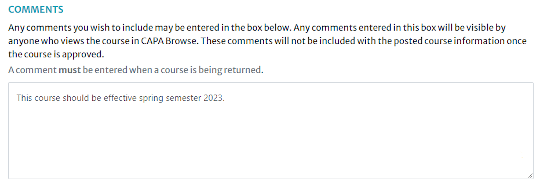Course Approval
ASSOCIATED LINKS
CAPA
CAPA Flowchart
CAPA Voting
CAPA Voting Instructions
Comprehensive Learner Record (CLR)
Course Approval
- New courses and changes to existing courses require approval through a faculty governance
approval process.
- The CAPA (Course Approval Process Automation) is an automated system for course approval at
the University of Georgia. CAPA allows faculty to input course information online.
- The course proposal is automatically routed to the next stage in the approval process.
The routing includes all levels of approval: department, college, graduate school,
and University Curriculum Committee.
- The system includes a browse function which allows all involved in the curriculum
approval process to know the status of any course or course change in the approval
process and to view all approved courses.
- All new course and course change applications that are approved in the CAPA System
will have an effective date of the fall semester following UCC approval. For example,
if a course is approved in CAPA in November 2022, the effective date is fall semester
2023.
Note: If there are circumstances when a course may be needed prior to fall semester following UCC approval, see below for processes for requesting an earlier effective term and/or requesting a temporary approval.
Submit Courses for Experiential Learning
CAPA provides an online approval workflow for courses to be submitted for consideration to satisfy the Experiential Learning Requirement. New courses and existing courses may be submitted to satisfy the Experiential Learning Requirement.
Experiential Learning Categories:
- Creative
Graduates who fulfill the requirement through creative experiences will have articulated, implemented, and reflected on a substantive application of their academic foundations to a real-world setting and/or challenge. - Global
Graduates who fulfill the requirement through study abroad or field study will interact with a culture and/or region distinct from their own and engage in academic inquiry and application afforded by the specific off-campus setting. - Internship
Graduates who fulfill the requirement through an internship will have practiced skills or methods related to their field of study through supervised work in a professional or organizational setting. - Leadership
Graduates who fulfill the requirement through leadership experiences will have articulated, implemented, and reflected on a substantive application of their academic foundations to a real-world setting and/or challenge. - Research
Graduates who fulfill the requirement by doing undergraduate research will demonstrate and describe how systematic and in-depth inquiry into a problem contributes to the discovery or interpretation of knowledge significant to their field of study. - Service
Graduates who fulfill the requirement through service-learning will demonstrate the ability to identify a community need and strategies for addressing it through mutual learning, critical analysis, reflection, and collaboration with a community partner.
CAPA – Experiential Learning – Workflow Routing:
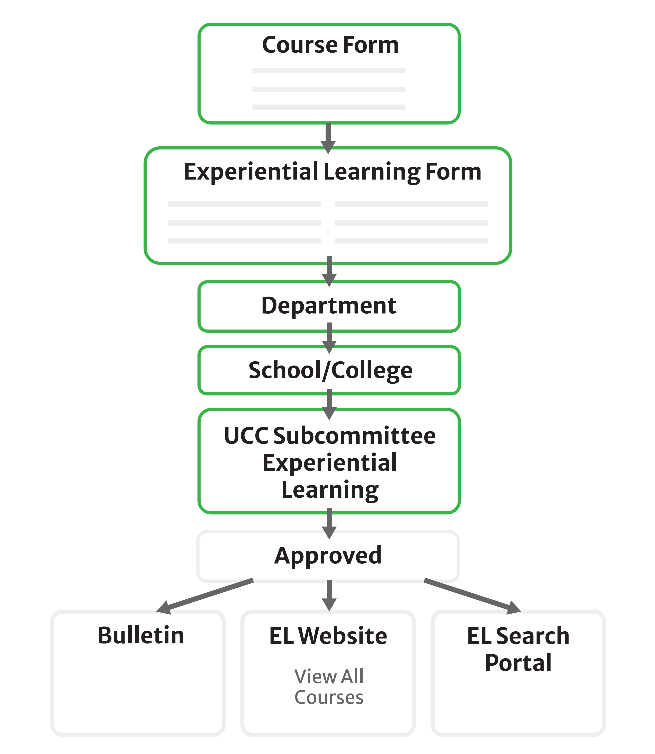
Experiential Leaning Tutorials:
Below are links to information and tutorials for submitting courses for Experiential Learning in CAPA.
These tutorials will explain the process for submitting courses for Experiential Learning and Institutional Competencies using the online course approval system, CAPA. This process will support the Comprehensive Learner Record, or CLR, at the University of Georgia.
The CLR is designed to highlight students’ validated competencies and achievements that they have acquired through their UGA coursework and activities. Courses and activities that are approved for Experiential Learning, and that meet the Institutional Competencies will be displayed in the CLR. For the CLR to be as robust as possible for our students, we encourage as many courses as possible to be submitted through these new CAPA processes.
Submit Courses for Institutional Competencies
CAPA provides an online approval workflow for courses to be submitted for consideration to satisfy UGA’s Institutional Competencies - . Course objectives and expected learning outcomes can be added and/or updated to provide evidence of how the course meets the approved Institutional Competencies for a course. New courses and existing courses may be submitted to meet the Institutional Competencies.
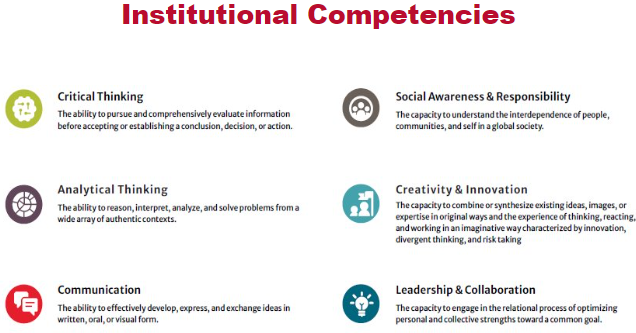
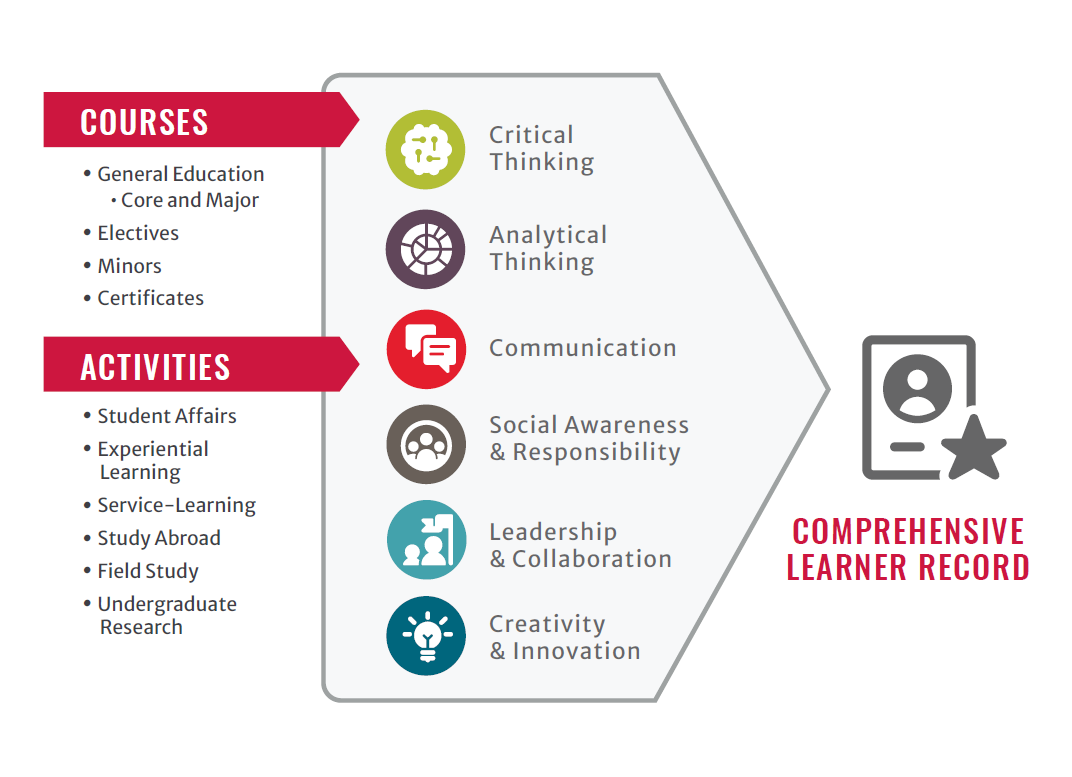
CAPA – Institutional Competencies – Workflow Routing:
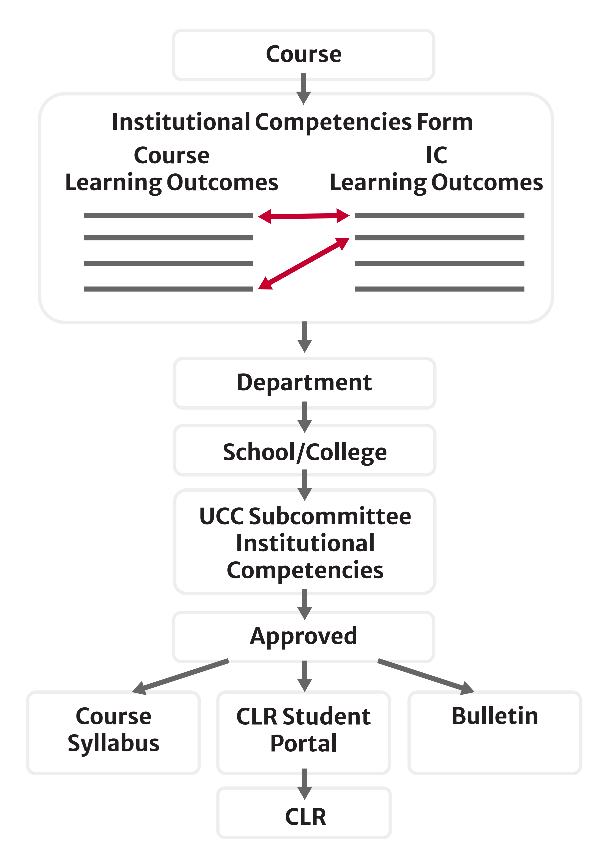
Institutional Competencies Tutorials:
Below are links to information and tutorials for submitting courses to meet Institutional Competencies in CAPA.
These tutorials will explain the process for submitting courses for Experiential Learning and Institutional Competencies using the online course approval system, CAPA. This process will support the Comprehensive Learner Record, or CLR, at the University of Georgia.
The CLR is designed to highlight students’ validated competencies and achievements that they have acquired through their UGA coursework and activities. Courses and activities that are approved for Experiential Learning, and that meet the Institutional Competencies will be displayed in the CLR. For the CLR to be as robust as possible for our students, we encourage as many courses as possible to be submitted through these new CAPA processes.
Deadlines for Submitting Course Applications
Courses Effective Fall 2024
Beginning in Fall 2019, the Bulletin will be in effect for the entire academic year. Adopting a yearly Bulletin will reduce confusion concerning requirements and expectations for students, advisors, faculty, and staff, as well as bring the University of Georgia in line with USG, peer, and aspirational institutions. Because of this change to a yearly Bulletin, all new course and course change applications that are approved in the CAPA System will have an effective date of the fall semester following UCC approval.
Request for Earlier Effective Term for Courses
There may be circumstances when proposed new courses and/or course changes are needed prior to the fall term following UCC approval. Below are the steps for requesting an earlier start term for new courses and course changes.
To request a start date change on a new course or course change proposal in CAPA:
- Departments/colleges/schools can add a statement in the COMMENTS box on the course proposal indicating the semester the course should be effective
(click image to enlarge)
- When the new course or course change proposal is reviewed by Curriculum Systems (Curriculum
Systems Staff Review), the effective date will be updated. The course proposal will
be approved in CAPA with the new effective date.
- If the COMMENTS box is not used, another option for updating the effective term is
for departments/colleges/schools to send an email to capa@uga.edu and ask for the effective date to be updated on the new course or course change proposal
in CAPA.
- When the course proposal is reviewed by Curriculum Systems (Curriculum Systems Staff Review) in the course approval process, the effective date will be updated and the course proposal will be approved with the new effective date.
Temporary Approval Process
Requesting a Temporary Approval – New Courses
A Temporary Approval request for a new course may be required if a course has been submitted in CAPA but will not receive all necessary approvals prior to the term the course is needed.
- Typically, temporary approvals for a new course would only be granted for:
- A course designed around a guest lecturer or visiting professor
- A grant-related course
- The new course information must be proposed in CAPA and approved through the department
head or school/college dean level prior to submitting a request for temporary approval
- Dean’s office submits an email to Curriculum Systems at capa@uga.edu that includes the following information:
- Course ID
- Effective semester for temporary approval
- Justification for requesting temporary approval
- Course must entered in CAPA and be past the department head or school/college dean approval step
- Note: if the course is cross-listed with a college-level course, the cross-lists’ dean’s office must approve
- Curriculum Systems unit will:
- Review request to determine if a temporary approval is necessary and meets criteria
- Review the course in CAPA to make sure course information is accurate and complies with policy
- Update Banner with the new course information
- Notify the department/school/college that the course is available in Banner for scheduling
- Note:
- If the new course is ultimately denied in CAPA after the temporary approval is approved, the course will be inactivated in Banner and will not be able to be scheduled in future semesters.
- A temporary approval request is not necessary if there is time for the course to be
proposed in CAPA and approved.
- For example: there is no need to request a temporary approval in December for a course needed in the following fall semester. The department or school/college should enter the course proposal in CAPA and, if needed, an earlier start term can be requested in the CAPA form, as outlined above in the “Request for Earlier Effective Term” process.
Temporary Approval Process – Course Changes
A temporary approval request for course changes will be limited to special circumstances. As students could be negatively impacted by a course change, a course change can only be granted temporary approval if:
- Banner sections of the course do not exist.
- Students are not registered for the course.
- The change will not impact program requirements.
To determine if a temporary approval for a course change can be processed, email Curriculum Systems at capa@uga.edu with the following information:
- Course ID
- Effective semester for temporary approval
- Justification for requesting temporary approval
Curriculum Systems will:
- Review request to determine if a temporary approval is necessary and meets criteria
- Check to see if course sections already exist in Banner
- Check to see if students are enrolled in course sections
- Determine if any students may be negatively impacted by the change
If it is determined that a temporary approval for a course change can be submitted, the same temporary approval process outlined above for new courses should be followed.
CAPA Course Suffix Guidelines
A course suffix is a letter that appears at the end of a course number to designate if the course fits one of the categories outlined below.
D Suffix - Non-Credit Discussion Group
Example of course ID: CSCI 2000-2000D
The D suffix is used for courses that have both a lecture and a break-out discussion
group. Separate sections are created for the lecture component (CSCI 2000) and the
discussion group component (CSCI 2000D). Students register for both sections, but
receive only one grade for the course. The lecture component carries credit hours;
the discussion group is non-credit.
E Suffix - Online Learning Course
Example of course ID: CSCI 2000E
The E suffix is used for online learning courses in which 95% or more of the course
content is taught online.
H Suffix - Honors Course
Example of course ID: CSCI 2000H
The H suffix is used for courses that are part of the UGA Honors Program. H suffix
courses will be routed through the Honors College for approval.
I Suffix - Integrated Language Course
Example of course ID: CSCI 2000I
The I suffix is used for courses that may use several approaches for integrating language
into a course, but will always include modules for vocabulary development, reading
comprehension, writing, and oral presentation.
L Suffix - Non-Credit Lab
Example of course ID: CSCI 2000-2000L
The L suffix is used for courses that have both a lecture and a break-out lab. Separate
sections are created for the lecture component (CSCI 2000) and the lab component (CSCI
2000L). Students register for both sections, but receive only one grade for the course.
The lecture component carries credit hours; the lab is non-credit.
L Suffix - Credit Lab
Example of course ID: CHEM 2111L
The L suffix is used for supervised lab courses. The lab carries credit hours. The
lab does not have a lecture component, but can have a stand-alone course as a co-requisite
(CHEM 2111, CHEM 21111L).
R Suffix - Undergraduate Research Course (CURO)
Example of course ID: CSCI 4960R
The R suffix is used for CURO-approved undergraduate research courses, a high-impact
practice (HIP). Undergraduate research is offered through a progressive R-suffix research
course sequence to promote a student's increasing skill development and depth of inquiry,
as well as growing independent research capability. In these courses, students apply
understanding of the discipline to identify or shape research questions, and apply
knowledge, skills, and techniques learned to this research. Students learn to gather
data, synthesize relevant literature, analyze and intrepret data, and communicate
their research, as appropriate.
The courses in the sequence are designated with the R suffix in course numbers 4960R, 4970R, 4980R (for research courses), and 4990R (the capstone of the sequence, a research thesis), and are available in most departmental course prefixes. At least one prior research course is required to register in the thesis course.
Proposals for additional R suffix course numbers may be considered if necessary to address a specific need or separate niche not covered by the existing course sequence. In all cases, courses with an R suffix will have the minimum requirements:
- individualized, independent, faculty-mentored research;
- students engage in research for at least 45 hours of research per credit hour earned;
- students complete at least one significant written assignment. Oral presentations of results, and participation in research-group meetings, is also highly recommended;
- students receive substantial feedback from the faculty mentor on their research progress and written (and oral if applicable) presentation of results.
Proposals for R suffix courses will be routed first through the Honors College for
approval.
S Suffix - Service-Learning Course
Example of course ID: CSCI 2000S
The S suffix is used for courses with a service-learning component, a high-impact
practice (HIP). Service-learning courses engage students through placements or projects
in addressing a real-world, community-identified need that relates to the course learning
objectives and serves the public good. Through critical reflection activities, students
demonstrate how their work benefits the community as well as enhances their academic,
civic, and/or personal learning. While the amount, focus, and partners for community-based
work can vary substantially, all S courses must include student involvement in, and
reflection on, projects/placements applying course content to benefit the (local,
state, national, or international) community.
Evidence of service-learning must also be included in the Course Objectives and/or
Topical Outline section of the course approval form; see examples on the Office of
Service-Learning website.
Proposals for S suffix courses will be routed through the Office of Service-Learning
for approval.
W Suffix - Writing Intensive Course
Example of course ID: CSCI 2000W
The W suffix is used for courses taught as writing intensive, a high-impact practice
(HIP). Writing intensive courses include substantial and ongoing writing assignments
that a) facilitate learning; b) teach the communication values of a discipline - for
example, its practices of argument, evidence, credibility, and format; c) support
writing as a process; and d) prepare students for further writing in their academic
work, in graduate school, and in professional life. Writing instruction and assignments
are integral to the class's learning objectives, and the instructor (and/or the teaching
assistant assigned to the course) will be closely involved in supporting students
as writers.
More specifically, writing-intensive classes:
- Involve students in informal writing assignments that promote course learning;
- Stage and sequence assignments to encourage writing as a process of creating and communicating knowledge;
- Maximize opportunities for guidance, feedback, and revision;
- Teach the writing conventions that are inseparable from modes of inquiry in a discipline;
- Make writing a substantive component of the overall course grade to underscore the value of writing the course, the discipline, and student learning.
Proposals for W suffix courses will be routed first through the Writing Intensive Program for approval.
Courses Eligible for Multiple Suffix Designations
Some courses may be eligible to be designated with more than one suffix type. For
example, a service-learning course (S suffix) that is also Writing Intensive (W suffix).
Courses that are eligible for more than one suffix designation should follow guidance
from the Curriculum Systems unit within the Office of the Registrar on which primary
suffix to use to designate the course. The additional course designation(s) will be
identified by using appropriate "attributes" for institutional tracking for all eligible
types.
For example, service-learning courses that are also Honors or Writing Intensive courses should request an S suffix with the same information as above, but also include "honors" or "writing intensive" in the course title as appropriate so the attributes can be designated accurately. Courses that include service-learning but are designated with a suffix other than S (e.g., E, L) should have the above content reflecting the service-learning component and should include "service-learning" in the course title; these courses will have the SERV (service-learning) attribute in Banner and will be treated the same as S courses for institutional reporting.
Please contact Curriculum Systems at capa@uga.edu or 706-542-6358 with questions about designating courses with multiple suffix types.
Contact
Users must be authorized to enter course information in the system. For information concerning CAPA, authorization to use the system, CAPA training, or the course approval process, please contact the Office of Registrar by calling (706) 542-6358 or by sending an email to capa@uga.edu.

